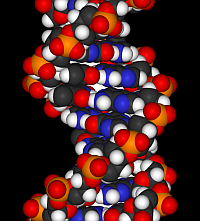The biotechnology companies Biogen Idec in Weston, Massachusetts and Isis Pharmaceuticals in Carlsbad, California have agreed to develop and commercialize an antisense treatment for myotonic dystrophy type 1, also known as Steinert disease. The deal, which involves Biogen Idec licensing antisense technology developed by Isis Pharmaceuticals, will gain Isis $12 million immediately and up to $259 million in subsequent milestone payments, with unspecified royalties after that.
Myotonic dystrophy type 1 is an inherited disorder, and a type of muscular dystrophy more common in adulthood, affecting at least 1 in 8,000 people worldwide (about 150,000 patients in the U.S., Europe, and Japan). Myotonic dystrophy is characterized by progressive muscle wasting and weakness, including prolonged muscle contractions, or myotonia, making a person with the disease unable to relax certain muscles after use.
There are two major types of myotonic dystrophy; the more severe type 1 affects the lower legs, hands, neck, and face. Other signs and symptoms include cataracts in they eyes and abnormalities of the electrical signals that control the heartbeat.
Antisense technology uses short DNA or RNA sequences, called oligonucleotides, designed to complement a specific gene sequence. The targets for antisense drugs are RNA molecules. Isis says it designs antisense drugs to interact precisely with a specific sequence of RNA. The company says many of the therapies in its pipeline bind to messenger RNAs (mRNAs) and inhibit the production of disease-causing proteins.
Myotonic dystrophy type 1 is caused by a genetic defect in the dystrophia myotonica-protein kinase (DMPK) gene, in which a sequence of three nucleotides repeats extensively, creating an abnormally long toxic RNA. This RNA accumulates in the cell and prevents the production of proteins needed for normal cellular function. Isis says one its antisense therapy is being developed to correct the underlying genetic defect that causes myotonic dystrophy type 1.
Under the agreement, Isis will receive an initial payment of $12 million and be responsible for the discovery of a lead antisense drug candidate targeting DMPK. Isis will be responsible for global development of the drug through the completion of phase 2 clinical trials, with Biogen Idec providing advice on the clinical trial design and regulatory strategy. Isis will then be eligible to receive up to $59 million in milestone payments associated with the clinical development of the DMPK-targeting drug prior to licensing.
Biogen Idec has the option to license the drug from Isis up through the completion of phase 2 clinical trials. If Biogen Idec exercises that option, it will assume global development, regulatory and commercialization responsibilities, and Isis could receive up to another $200 million in a license fee and regulatory milestone payments. Isis will also be eligible to receive what the companies call “double-digit royalties” on sales of the drug.
In January 2012, Biogen Idec and Isis agreed to a collaboration/option deal to develop and commercialize an Isis antisense investigational drug for spinal muscular atrophy.
Read more:
- Stem Cells to be Produced for Research in Muscle Disorders
- Biogen Idec, Samsung to Form $300M Biosimilar Venture
- Trial Shows Safety of Engineered Gene Therapy
* * *


 RSS - Posts
RSS - Posts
You must be logged in to post a comment.